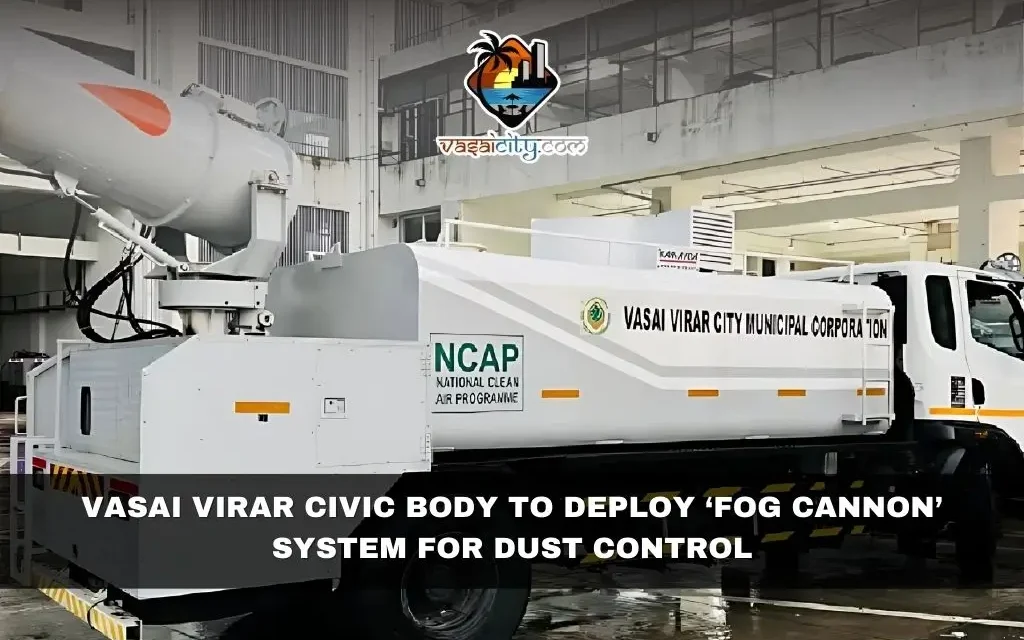The city of Vasai Virar is set to take a significant step toward improving its air quality by introducing fog cannon vehicles to control dust pollution. With the rapid urbanization of the region, air pollution levels have been rising due to increased traffic and ongoing construction projects. In response, the Vasai Virar Municipal Corporation (VVMC) has decided to purchase five fog cannon trucks, which will soon be operational on the city’s streets. These vehicles are designed to spray a fine mist of water into the air, capturing airborne dust particles and helping to reduce pollution levels.
A Growing Concern for Air Quality
Vasai Virar has seen tremendous growth in recent years. With new residential and commercial developments springing up, the city’s population has surged, leading to more traffic and construction activities. As a result, the air in the city has become increasingly polluted with dust particles. This not only affects the overall quality of life but also poses significant health risks to residents, particularly those with respiratory issues.
Local citizens have raised concerns about the deteriorating air quality, especially as dust from construction sites and unpaved roads continues to accumulate in the air. The VVMC, recognizing the urgency of the situation, has moved forward with its pollution control efforts, with fog cannon trucks being a key part of their strategy.
How Fog Cannon Technology Works
The fog cannon technology works by spraying ultra-fine droplets of water into the air. These droplets attach to dust particles suspended in the air and bring them to the ground, significantly reducing airborne particulate matter. Each fog cannon truck is equipped with a 10,000-liter water tank, allowing it to spray water over large areas, such as busy roads, public spaces, and interior streets where dust pollution is most severe.
The fog cannons are expected to operate regularly, targeting areas with heavy traffic and ongoing construction, which are the primary sources of dust pollution. Apart from cleaning the air, the trucks will also help wash down dust-covered trees and dividers in the middle of roads, which have been accumulating dirt and grime. This dual function of air and surface cleaning is expected to contribute to an overall reduction in pollution levels in the city.
The fog cannon system has been allocated a budget of ₹3.2 crore, a substantial investment by the VVMC, showing the seriousness with which the city is addressing its pollution problem.
Wider Pollution Control Efforts in Vasai Virar
The introduction of fog cannon vehicles is not the only measure the VVMC is taking to curb pollution. Under the National Clean Air Programme (NCAP), the civic body has been implementing several initiatives to improve the city’s air quality. Some of these initiatives include tree plantation drives, the development of Miyawaki forests (dense urban forests) to increase green cover, and the installation of air purification systems at six locations throughout the city.
The use of mechanical sweepers has also been part of the city’s ongoing effort to keep roads clean. Seven new mechanical brooming vehicles have been purchased to sweep streets and sprinkle water along the main roads and edges to prevent dust from becoming airborne. This helps to minimize the dust that would otherwise be stirred up by passing vehicles.
In addition to these efforts, the municipal corporation has also taken steps to reduce emissions from public transport. The VVMC has started an electric bus service, aiming to reduce the number of diesel-powered vehicles on the roads. This initiative is part of the broader effort to cut down on harmful pollutants that contribute to poor air quality.
Fog Cannons to Be Operational Soon
The deployment of fog cannon vehicles is expected to begin within a week, according to Nanasahab Kamathe, Deputy Commissioner of Solid Waste Management for the VVMC. These vehicles will be a crucial part of the city’s ongoing efforts to tackle dust pollution, especially in areas where construction is rampant and traffic is heavy.
“Reducing dust pollution is a top priority for us. These fog cannon trucks will help in keeping the air cleaner for our residents. We hope to see a noticeable improvement in the city’s air quality once they are operational,” Kamathe said.
The city administration believes that this initiative, combined with other pollution control measures, will significantly reduce the amount of particulate matter in the air, making it safer and healthier for residents.
Public Health and the Need for Action
The VVMC’s decision to deploy fog cannons and implement other air quality measures comes at a critical time, as air pollution poses an increasing threat to public health. Studies have shown that prolonged exposure to high levels of dust and particulate matter can lead to respiratory issues such as asthma, bronchitis, and even more severe conditions like lung cancer and heart disease.
By taking proactive steps to reduce pollution, the civic body is not only addressing immediate concerns but also contributing to the long-term well-being of its residents. Cleaner air means fewer health issues, and a more pleasant environment to live in.
A Hopeful Future for Vasai Virar
As Vasai Virar continues to grow and evolve, the city’s administration is focused on ensuring that this growth does not come at the cost of its residents’ health and quality of life. The fog cannon initiative, along with other pollution control measures, is a sign that the civic body is serious about tackling the city’s environmental challenges.
With continued efforts to reduce dust, plant more trees, and clean the streets, Vasai Virar is setting an example for other rapidly urbanizing cities on how to manage air quality effectively. Residents can look forward to breathing cleaner air in the coming weeks as these new fog cannon vehicles hit the streets and start making a difference.
In conclusion, the introduction of fog cannon trucks is a welcome move by the Vasai Virar Municipal Corporation. It represents a solid step toward creating a cleaner, healthier city. While there is still much work to be done, this initiative gives hope that the air quality in Vasai Virar will improve, benefitting all those who call this city home.









